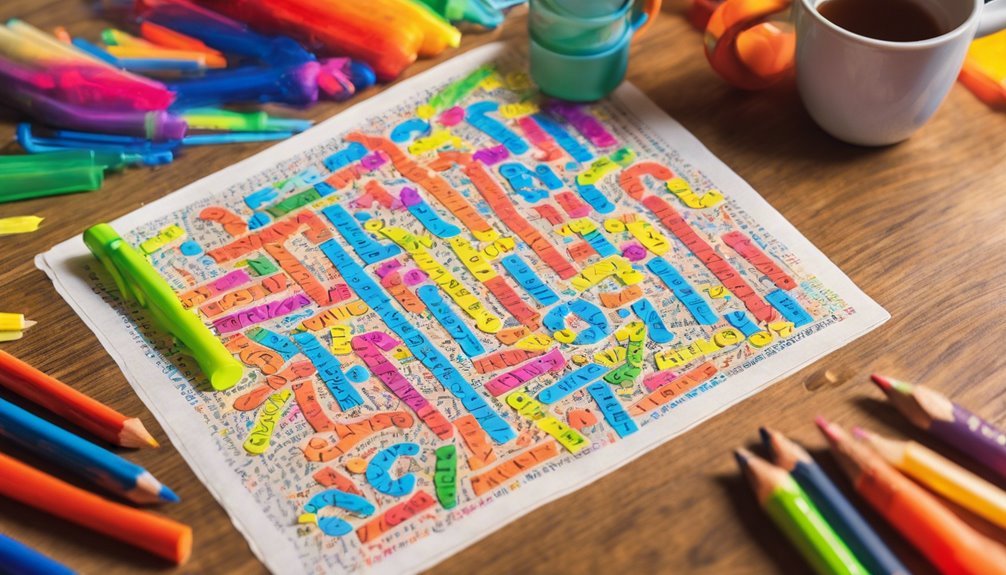How Word Search Puzzles Improve Spelling and Reading Skills
Imagine sifting through a sea of letters, searching for hidden words that bring them to life. As you engage in this puzzle, you're not just having fun; you're sharpening your spelling and language skills. Each word you find reinforces your understanding of spelling patterns and enhances your ability to recognize words in various contexts. Curious about how this simple activity can transform your language abilities? Let's explore the benefits of word search puzzles further.
Key Takeaways
- Word search puzzles enhance spelling by providing repetitive exposure to word structures and letter combinations.
- Engaging with puzzles improves reading skills through increased familiarity with language patterns and vocabulary.
- The activity develops mental agility, allowing for quicker recognition and processing of words while reading.
- Regular practice with word searches reinforces memory retention, aiding in spelling recall and comprehension.
- Puzzles stimulate pattern recognition, strengthening the ability to decode unfamiliar words and enhance overall reading proficiency.
The Cognitive Benefits of Word Search Puzzles
While you might think of word search puzzles as just a fun pastime, they actually offer significant cognitive benefits that can enhance your spelling and reading skills. Engaging in these puzzles requires you to develop mental agility, sharpening your ability to think quickly and make connections.
As you search for words hidden among letters, you're not just playing; you're honing your pattern recognition skills. This ability helps you identify word structures and letter combinations, crucial for improving spelling.
Furthermore, the repetitive nature of finding words reinforces memory retention, making it easier to recall spellings later. By regularly tackling word searches, you're not just entertaining yourself; you're actively training your brain to become more efficient in processing language, ultimately boosting your reading capabilities.
Enhancing Vocabulary Through Word Searches
As you dive into word search puzzles, you'll likely find that they do more than just entertain; they can significantly enhance your vocabulary.
These puzzles foster vocabulary expansion and promote contextual learning, helping you grasp new words in various contexts. As you uncover hidden words, you engage with language actively, reinforcing your understanding and retention.
Consider these benefits:
- Exposure to New Terms: You'll encounter words you mightn't typically use.
- Improved Word Recall: The repetitive nature of finding words boosts memory.
- Engagement with Definitions: Searching in themed puzzles encourages you to explore meanings.
Developing Word Recognition Skills

Engaging with word search puzzles not only expands your vocabulary but also sharpens your word recognition skills. As you scan for words, you enhance your visual recognition, allowing you to identify familiar patterns and letters quickly. This practice reinforces your ability to recognize words at a glance, which is crucial for fluent reading.
Additionally, word searches promote phonetic awareness by encouraging you to connect sounds with letters, helping you decode unfamiliar words more effectively. Each puzzle becomes an opportunity to strengthen these skills, leading to greater confidence in your reading abilities.
Strengthening Attention to Detail
When you dive into a word search puzzle, you're not just having fun; you're also honing your attention to detail. This practice sharpens your ability to notice subtle differences and enhances your focus techniques. Each time you scan for words, you're employing detail-oriented strategies that translate to various aspects of life.
Consider these benefits:
- Improved Observation: Regularly solving puzzles trains your brain to catch tiny details.
- Enhanced Concentration: You'll find it easier to maintain focus on tasks without getting distracted.
- Increased Patience: Working through challenges builds your ability to take time and be thorough.
Ultimately, word search puzzles are a simple yet effective way to strengthen your attention to detail, setting the stage for greater mastery in reading and spelling.
Engaging Different Learning Styles

Whether you're a visual learner, an auditory learner, or someone who thrives on hands-on activities, word search puzzles cater to various learning styles. These puzzles enhance visual learning by presenting words in a grid, allowing you to spot patterns and connections. For auditory engagement, consider discussing the words with others or reading them aloud, reinforcing recognition through sound.
Here's a quick overview of how word searches appeal to different styles:
| Learning Style | Word Search Benefits |
|---|---|
| Visual Learning | Enhances pattern recognition |
| Auditory Engagement | Promotes verbalization |
| Kinesthetic Learning | Involves physical interaction |
| Reflective Learning | Encourages quiet thinking |
| Social Learning | Fosters group discussions |
Embrace the versatility of word searches to boost your skills!
Incorporating Word Searches in the Classroom
Word searches can be a dynamic tool in the classroom, offering a fun way to reinforce spelling and reading skills among students. By incorporating word searches into your lesson plans, you can effectively utilize word search strategies for enhanced classroom implementation.
Here are three ways to integrate them:
- Thematic Word Searches: Create puzzles that align with current topics or themes, deepening students' understanding.
- Collaborative Activities: Encourage teamwork by having students work in pairs or small groups to solve word searches together.
- Timed Challenges: Introduce friendly competition with timed puzzles, motivating students to improve their speed and accuracy.
These approaches not only engage students but also enhance their spelling and reading proficiency, making learning an enjoyable experience.
Tips for Making Word Searches More Effective

To maximize the effectiveness of word searches in your teaching, consider incorporating a variety of strategies that cater to different learning styles.
Creating custom themes can enhance engagement; for example, use vocabulary related to a current lesson or students' interests. This personal touch makes the puzzles more relevant and fun.
Additionally, introducing timed challenges can boost motivation and urgency. Set a timer, and encourage students to find words quickly, promoting a friendly competition that energizes the classroom.
You can also mix up the difficulty levels to challenge advanced learners while still supporting those who need extra help.
Word Searches as a Family Activity
Family game nights can become even more enjoyable when you incorporate word searches into the mix. Not only do they boost spelling and reading skills, but they also foster family bonding and fun competition.
Here's how to make the most of your word search sessions:
- Create custom puzzles based on family interests or themes.
- Set a timer for a friendly race to see who can find the most words.
- Discuss the words you find, enhancing vocabulary and comprehension.
Frequently Asked Questions
Can Young Children Benefit From Word Search Puzzles?
Absolutely, young children can benefit from word search puzzles.
These puzzles stimulate cognitive development as they challenge kids to recognize patterns and letters. You'll notice your child's problem-solving skills improve as they navigate through the grid, searching for specific words.
Engaging with these puzzles not only enhances their focus and concentration but also makes learning fun.
Are There Specific Themes That Enhance Learning Through Word Searches?
Imagine diving into a treasure chest full of words. You discover that specific theme variations in word searches, like animals or geography, can significantly enhance your vocabulary.
When you tackle these themed puzzles, you're not just finding words; you're engaging with concepts and context. This active involvement makes learning more enjoyable and effective, helping you master new terms and deepen your understanding.
How Long Should a Word Search Puzzle Take to Complete?
When tackling a word search puzzle, the time it takes to complete can vary based on puzzle complexity and your time management skills.
Generally, a simple puzzle might take about 5-10 minutes, while a more challenging one could require 15-30 minutes.
To enhance your experience, set a timer for yourself; this way, you can improve your focus and efficiency, ultimately mastering the art of solving word searches in a timely manner.
What Types of Words Are Best for Beginner Puzzles?
When you create beginner word search puzzles, think of bright colors and playful letters dancing on the page. Focus on sight words and simple vocabulary; these are perfect for newcomers.
Using familiar terms helps build confidence as you search through the grid, making the experience enjoyable. Start with short, common words that kids encounter daily.
This way, you'll spark their interest and lay a solid foundation for future reading adventures. Happy puzzling!
Can Digital Word Search Puzzles Be as Effective as Print Ones?
Digital word search puzzles can be just as effective as print ones. They offer greater puzzle accessibility, allowing you to play anywhere with a device.
Plus, the digital format often boosts your engagement with features like timers and hints. This interactivity can enhance your focus and enjoyment, making it easier to learn.
Conclusion
Incorporating word search puzzles into your routine can be like planting seeds in a garden of knowledge, where spelling and reading skills blossom over time. As you dive into the challenge, you'll find your vocabulary expanding and your recognition sharpening, making language feel like a vibrant tapestry. Whether you're in the classroom or at home, these engaging puzzles not only sharpen your mind but also create lasting memories, turning learning into a joyful adventure for everyone involved.







